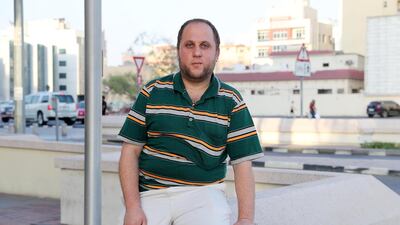Homeless but far from hopeless, Syrian man Mohammed Taha can now dare to dream of a brighter future after the UAE launched a one-year visa amnesty for citizens of war-torn countries.
Mr Taha was forced to leave his family behind when he fled Syria's civil war in 2014, with his brother travelling to Turkey while he sought sanctuary in Dubai.
The 30-year-old tried to pay his way in his new home, working at a restaurant in Satwa before he found himself out of a job two years later after a dispute between the owners.
The National first spoke to Mr Taha, from Aleppo, last year, when he told of how he was forced to sleep in parks or in mosques after losing his job and quickly running out of cash.
He has had to survive on the streets ever since, seeking shelter in mosques to escape the searing heat and get some sleep whenever possible.
Mr Taha said: “I prefer to walk around during night as temperatures soar during day time. I sleep at mosques until noon prayers and start my daily journey on the city’s streets. I am usually in the Muraqabat area [of Deira].
“All I want in this life is to amend my residency visa status, find a job and sleep on a comfy bed at night. I and many others left Syria looking for a chance of a better life.”
Now he feels his simple hopes could yet be realised after the UAE Cabinet, chaired by Sheikh Mohammed bin Rashid, Vice President and Ruler of Dubai, adopted a resolution that will grant citizens of countries in which there are wars and natural disasters extendable one-year permits – regardless of their condition of residence – from August 1 to October 31 this year.
The decision means that those affected will be able to remain in the UAE if they come forward, declare their illegal status and apply for permission to stay.
Read More:
______________
Visa amnesty gives fresh hope to Syrians in the UAE
The Cabinet visa announcements: what has changed?
New one year residencies for widows and divorcees explained
______________
Those who come forward during the grace period will not face legal consequences and will be exempt from any imposed fines.
Mr Taha said the new visa regulations offer relief from the threat of being deported and paying thousands of fees for overstaying in the country.
“I could not believe it when I heard about the new residency rule. I will definitely approach the authorities and inform them about my current situation,” he said.
The National met Mr Taha in Al Muraqqabat, in Deira, where he can often be found roaming the streets. He was stopped by couple of people who greeted him and asked how was he doing as he shared his story.
“I worked in other restaurants hoping I get my residency visa renewed. Owners of different restaurants promised to renew my visa after testing my culinary skills, which never happened,” he added.
“The scenario kept repeating itself with several restaurant owners until I lost hope in finding a job and overstaying fines had accumulated. I do not have enough money to pay the fines, could not find any job to support myself and I can’t travel back to Syria due the political situation. Thus, I am left on the streets and I have no other option,” said Mr Taha.
Mr Taha said the recent announcement related to visa amnesty offers respite from concerns he may have to pay a huge amount for overstay fines or go back to Syria.
“I am very grateful to the UAE for this opportunity,” he said.
Mr Taha hopes to find a job or travelling abroad if he cannot stay in the UAE.
Mr Taha said many good people have provided him with food and water.
“Many workers at restaurants give me food and water. Sometimes, I eat in mosques.”
Before being left on the streets, Mr Taha lived in accommodations in Satwa and Hor Al Anz. He would rent a bed space for Dh400.
The Syrian national approached charity organisations and was told that donations are only made to families, elderlies or those physically disabled to work.
Scenes of damage and daily killings were experienced by Mr Taha while he was living in Syria.
He has experienced tough times, too, but is hopeful for what lies ahead.

